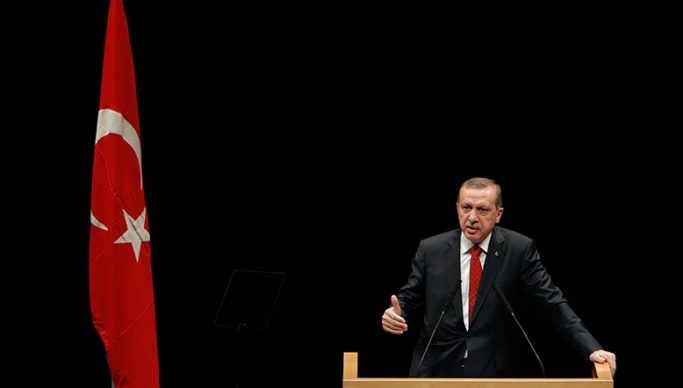
Istanbul’s First New Church in Over a Century Sparks Joy Along With Calls for More Respect for Minority Religions
- By Gladys McBride --
- 07 Nov 2023 --
Turkish President Recep Tayyip Erdoğan said of it, “The church we have built is a symbol of freedom of religion and belief in our country.”
It was an apparent about-face for Erdoğan, who previously had spent much of his time as president soldering in Islam as part of the Turkish identity, a departure from his predecessors’ nearly century-long secularization policy.
The October 15 inauguration of the new house of worship, Mor Ephrem Syriac Orthodox Church, attended by hundreds of Assyrian Syriac Christians, was a dream come true for a religious community that once numbered hundreds of thousands but has been decimated by genocide, persecution and diaspora over the decades.
Turkey’s Assyrian Christians, now numbering just 25,000, are scattered across the Syriac Church, the Assyrian Church of the East and Latin Uniate Churches (Christian Churches in eastern Europe or the Near East that acknowledge papal supremacy but retains their own liturgy), although most identify as Syriac Orthodox, one of the oldest branches of the church.
The Syriac Orthodox liturgy is in Aramaic, the everyday language of Jesus and his followers. “We’re a very ancient people, a Mesopotamian people,” said Katia Arslan, an Assyrian who studies Turkey’s minority peoples.
The new church’s opening was historic for all Christian denominations throughout Turkey, marking the first new church of any kind built since the founding of the Turkish Republic 100 years ago. The early decades of the republic were marked by ethnic and religious minority repression under the guise of strengthening a new nationalist Turkish identity.
The Rev. Luka Refatti, the Dominican pastor of the neighboring Mary Queen of the Rosary Catholic Church, stood alongside other clergy at the front of the church at Mor Ephrem’s inauguration.
“Now, for them, it is a new stage,” he said. “I hope that this won’t just be a place to show and display their own identity, but also to pray and meet God. Not just for Syriac Christians but all denominations.”
The new building—five stories tall, with a 750-seat sanctuary—mixes modern with traditional Syriac. Its facade includes a sandstone design that pays homage to Syriac churches in Turkey’s southeastern Mardin province, a historically Syriac area, while the sanctuary itself is adorned with frescoes of early church figures such as its fourth-century namesake, Saint Ephrem the Syrian.
While the church is cause for celebration, a measure of skepticism among Turkey’s religious minorities may be excused. Although Turkish constitutions have granted equal rights to non-Muslim minorities, that equality has largely existed only on paper.
Erdoğan has had a checkered relationship with Turkey’s Christians since he rose to power in the late 1990s. On the one hand, he aggressively inclined the nation toward Islam, sometimes leaving Christian denominations behind. On the other, however, he has allowed several churches and synagogues that the state had previously expropriated to reopen as museums and cultural centers or even as active houses of worship.
Just a year after laying the foundation stone of Mor Ephrem in 2019, Erdoğan stirred the suspicion and spleen of the Christian world when he converted Hagia Sophia, a UNESCO World Heritage site once a beloved center of both Byzantine Orthodox Christianity and Ottoman Islam, back into a mosque.
Stirring the pot further, a month later, the ancient Chora Church/Kariye Mosque, which had been maintained neutrally as a museum for a century, also reverted to a Muslim sacred space. Greece’s foreign ministry called it “a provocation against all believers.”
The Syriac Christian community was taken aback by the two major moves within the space of one month. David Vergili, editor of Sabro, a journal covering the Syriac diaspora said, “Converting Hagia Sophia in Istanbul and other churches in the country, the destruction of Christian heritage alongside long-held obstacles and difficulties for the ancient Christian communities in the country are real concerns for our people.”
The following year, 2021 saw the arrest and imprisonment of Syriac monk, Aho Bileçen, an incident that outraged the worldwide Assyrian community and increased concerns over Erdoğan’s actual intentions toward minority religions, as distinguished from his words. Aho Bileçen was arrested and sentenced to two years in prison on charges of “membership in a terrorist organization” for giving food and water to members of the Kurdistan Workers’ Party deemed a terrorist organization in Turkey. He was released and placed on parole after his sentencing sparked public protest.
“The protection and well-being of Syriac people and Christian communities need a long-term project in line with truth, transparency and democratic principles,” Vergili said.
Or as Erdoğan himself said on visiting the new church, “At a time when divisions, conflicts and hate crimes based on religious and ethnic origin are increasing in our region and the world, this embracing attitude of Turkey is very important.”


















